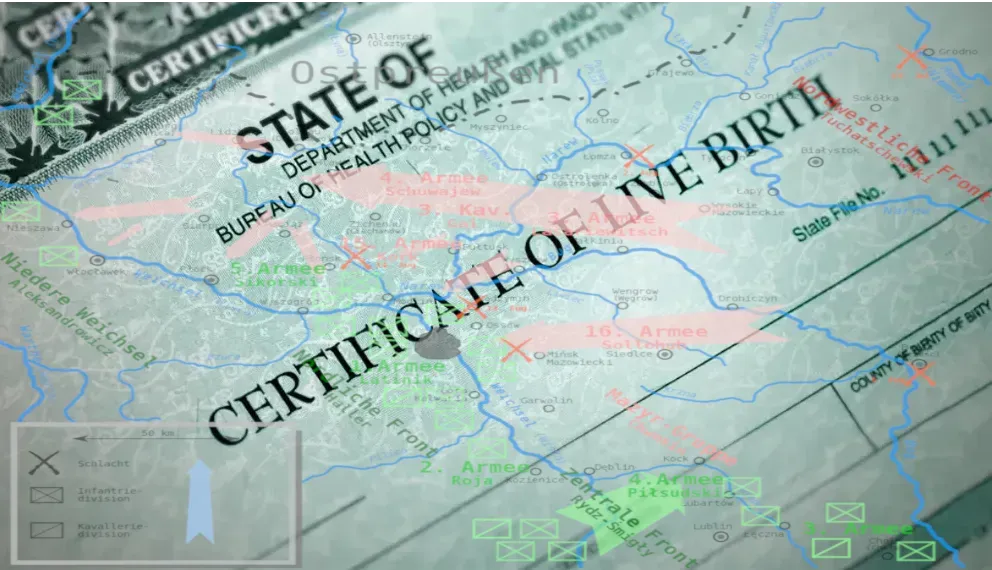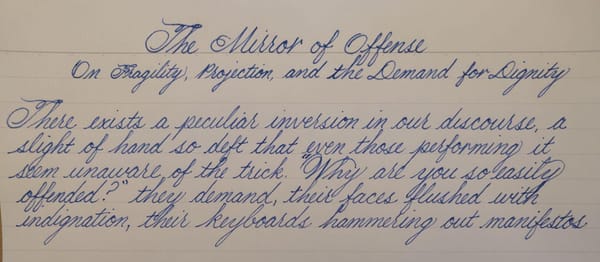The Inconvenient Truth about Birth Certificates

Birth Certificates Are Living Documents, Not Historical Monuments
When it comes to official documentation, facts matter. So let's examine some important facts about birth certificates – what they are, how they work, and why allowing transgender people to update them is consistent with longstanding practices across the United States.
What Birth Certificates Actually Are
Birth certificates serve dual purposes in our society. They document the fact that a birth occurred, but more importantly, they function as foundational identity documents that individuals use throughout their lives to:
- Obtain other forms of identification
- Enroll in school
- Apply for employment
- Access government services
- Claim inheritance
- Establish citizenship
While they record a historical event (birth), their primary purpose is functional – they are living documents that establish legal identity.
Birth Certificates Are Regularly Amended
Despite claims that birth certificates should never be changed because they're ‘‘historical records,’’ these documents are routinely amended for many reasons:
- Adoption: When a child is adopted, birth certificates are updated with the adoptive parents' names
- Paternity establishment: When paternity is determined after birth
- Legal name changes: Following court-approved name changes
- Corrections: For clerical errors or incomplete information
In each case, the state preserves the original information while issuing an updated certificate. Nothing is ‘‘falsified’’ or erased – the record is simply updated or corrected to reflect current legal reality.
Birth Certificates Are Not Public Documents
Contrary to Lisa Shultz's claim that ‘‘A birth certificate is not the property of the child whose birth is documented. It is a factual record that belongs to the public,’’ birth certificates are not public records available to anyone.
Access to birth certificates is strictly limited by law in all 50 states. Generally, only the following individuals can obtain copies:
- The person named on the certificate
- Parents and/or Legal Guardians (only while the person is a minor)
- Legal representatives with specific authorization
Birth certificates contain sensitive personal information and are protected by privacy laws. The public cannot simply request anyone's birth certificate because, and I cannot stress this enough – they are personal identity documents belonging to the person named on the certificate. They serve the individual throughout their lifetime - not public archives for others to control.
The Medical and Legal Necessity of Accurate Documentation
For transgender individuals, having identity documents that don't match their gender presentation creates significant barriers:
- 87% of transgender people report experiencing discrimination when presenting ID that doesn't match their gender presentation
- Mismatched documents can lead to harassment, denial of services, and even violence
- Medical care can be compromised when documents don't reflect a person's lived identity
- Employment opportunities are limited when ID documents conflict with appearance
Medical authorities including the American Medical Association, American Academy of Pediatrics, and American Psychological Association all support transgender people's access to accurate identification documents as part of comprehensive healthcare.
The Bigger Picture: Documentation as the Next Front in the Battle
What we're witnessing with this birth certificate campaign isn't happening in isolation. It represents the latest phase in the evolving strategies of anti-transgender efforts:
- Bathroom bills and fear-mongering about public spaces
- Sports bans and ‘‘protecting women's athletics’’
- Healthcare bans, especially targeting youth and parents supporting them
- Bureaucratic erasure through documentation control
This newest approach is particularly concerning because it sounds reasonable to uninformed listeners (‘‘shouldn't records be accurate?’’) while creating systemic barriers that make daily life practically impossible for transgender people.
By shifting from ‘‘protecting children’’ to ‘‘protecting records,’’ these campaigns create a new rhetorical framework for opposing gender transition at any age. It's a more subtle form of erasure than bathroom bills or sports bans, but potentially more far-reaching in its effects.
This represents another line that must be drawn and defended. If transgender people cannot have accurate identification documents, they effectively cannot fully participate in society – which appears to be precisely the point.
What This Is Really About: A Mother's Control, Not "Historical Accuracy"
Now let's address what's really happening with Lisa Shultz's letter-writing campaign. Because buried in her appeal for "accurate historical records" is this telling admission:
‘‘I am one person among many in the US who are directly impacted by the birth certificate issue. My name is now on an 'original' birth certificate that has been falsified and does not reflect the truth and facts that occurred on the day of my daughter's birth. This issue has devastated my family.’’
Let's be crystal clear: Lisa Shultz, author of ‘‘Trans Train,’’ is not launching a campaign because she's concerned about "document or historical integrity." She's doing it because her son updated his birth certificate to reflect his gender identity, and she was powerless to stop it, and she does not like it - not one bit.
This isn't about protecting ‘‘historical records’’ – it's about a parent who refuses to accept her adult child's identity and is attempting to use bureaucracy and legislation to override his autonomy, and using the broader trans population as her proxy for her son.
When Shultz claims this issue has ‘‘devastated’’ her family, she fails to consider how her son might feel being misgendered on official documents, or the barriers and discrimination he would face with mismatched identification, or the compromise to his personal safety that could result.
Her proposed solution – forcing all states to either prevent transgender people from updating birth certificates or requiring parental notification and consent for adults – isn't about accuracy. It's about control.
The letter template she provides even states: ‘‘I request that the truthful facts of that day on the original birth certificate be reinstated.’’ Translation: ‘‘I want the government to override my adult child's legal identity because I don't agree with it.’’
The Consequences of Denying Document Updates
If Shultz's campaign succeeded, the consequences would be severe:
- Transgender individuals would face increased discrimination, harassment, and violence when forced to use mismatched documents
- Legal identity would effectively be linked permanently to gender assigned at birth contradicting established medical understanding of gender identity
- Trans people would face additional barriers to employment, housing, education, and healthcare
- Parents would gain unprecedented control over their adult children's legal identity long into adulthood
- To say nothing of the impact this would have on intersex folks…
Is preserving a parent's feelings about their child's identity more important than the child's safety, well being, and legal autonomy? Because that is the real question at the heart of this issue.
Birth Certificates Should Serve the People They Identify
Birth certificates, like all identity documents, should serve the people they identify. When transgender people update their birth certificates, they're not ‘‘falsifying’’ history – they're ensuring their legal identity matches their lived reality.
The vast majority of states already allow birth certificate updates for various life events, and most preserve original records while providing updated certificates. Whereas I personally see this approach to be a bit specious, it does present a balanced approach that respects both historical record-keeping and the needs of living people navigating the world with these documents. Why is this an issue, if all we really care about is ‘‘historical accuracy?’’
Again, it seems to me that what Lisa Shultz is advocating isn't really about preserving accurate records – it's about denying her son, and all transgender people, the dignity of accurate identification. And no appeal to ‘‘historical accuracy’’ can disguise that reality.
So What's Really Going On Here?
So let me get this straight. Lisa Shultz son is an adult and trans, and when he reached adulthood (or some time later, I don’t know the specifics), she ultimately lost control over her adult son's identity documents, as does any parent when their minor child reaches the age of adulthood. Her response is not to accept that things are as they are, but to launch a letter writing campaign in an effort to make sure no other transgender person can update their birth certificate either?
What we're witnessing here is the bureaucratic equivalent of "If I can't have him as my daughter, then I'll make sure the entire system punishes every trans person in the country." It's weaponizing paperwork as revenge against not just her son, but an entire community of people who had absolutely nothing to do with her family drama.
Here's the most telling part: At no point does Shultz consider what her son wants or needs. It's all about her feelings, her devastation, her name on a document she rarely, if ever, actually sees and more crucially, serves no further use or purpose to her in her life. When you care more about a piece of paper in a government filing cabinet than your child's ability to safely navigate the world or their happiness and future, you've completely lost the plot.
And that's what makes this campaign so insidious. It's not just a mother struggling with acceptance – it's using that personal struggle as justification to harm thousands of people she's never met. It's turning private grief into public policy (and profit!1). It's saying, "I couldn't control my son, so I'll use the government to control everyone like him."
Let’s not forget the larger picture and how this ties into the anti-trans efforts sweeping the US right now - this is the next stage in a bigger fight, all aimed at undermining the legitimacy and personhood of all trans folks. And if they can undermine the rights of one small minority population over this, then nothing will stop them when the go after marriage certificates and adoption papers next. And if you think the fallout from trans folks having mismatching sex markers is going to be bad enough, imagine what it will mean for that gay couple’s adopted kid, or your marriage certificate. Granted, the methods and means will be different for those cases, and each will be its own battle, but the precedent will be set. And the erosion of trans rights is the erosion of human rights, and the only thing it takes for that to happen is for good people to stand by and do nothing.
So the next time someone tries to convince you that preventing transgender people from updating their birth certificates is about "historical accuracy," remember what it's really about: a parent who couldn't accept that sometimes, the most accurate thing a document can do is reflect who someone actually is – not who their parent wishes they would be.
And that's not just an inconvenient truth - It's the whole damn point.
And that's why we must protect the right of all people to have documentation that reflects who they truly are - not who others demand they be.
1 Let’s not forget how people like Shultz monetize their activism through books, speaking engagements, subscriptions, etc.


